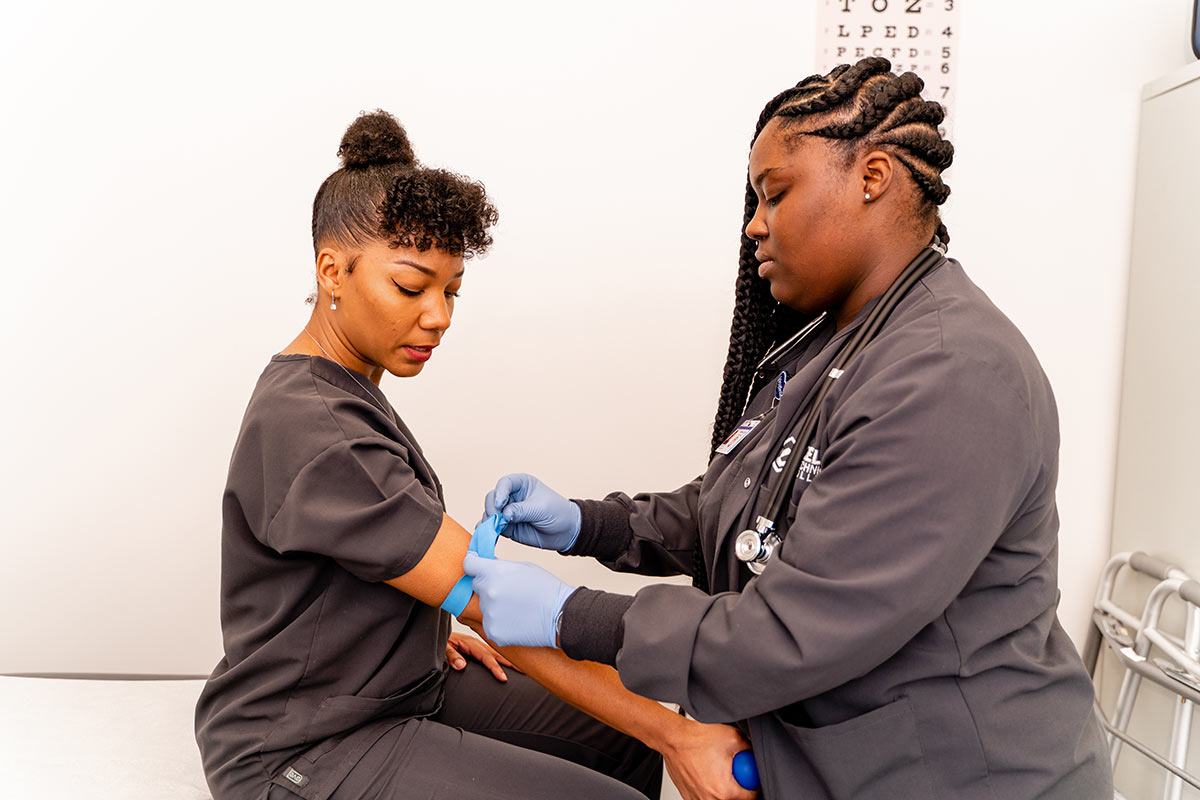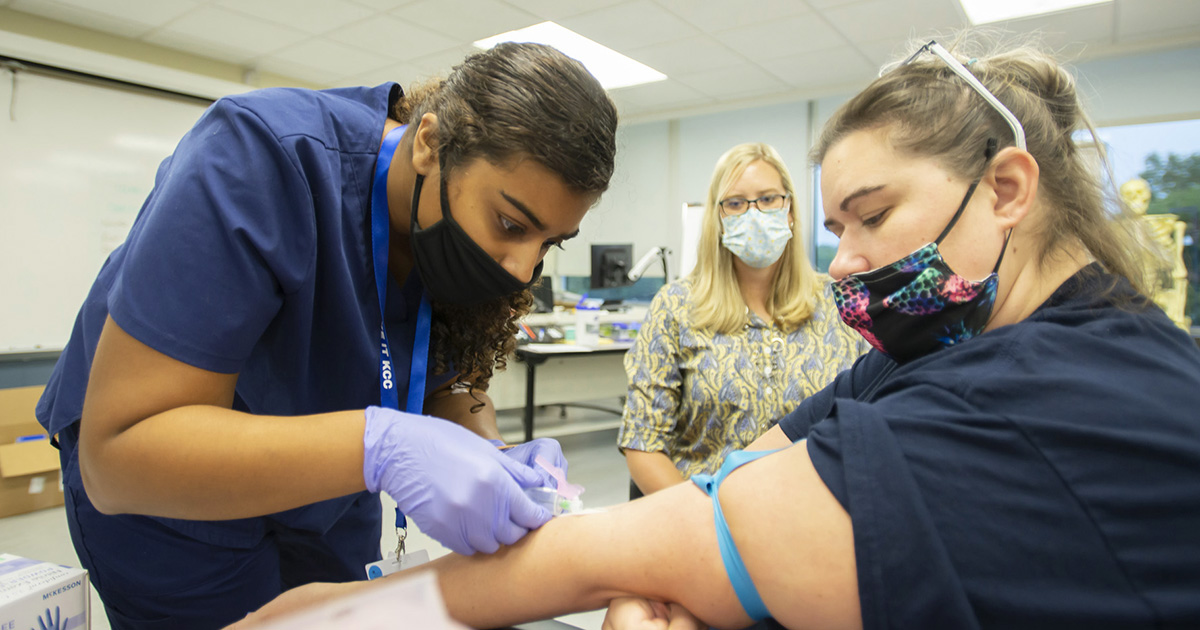What to Expect on the Certification Exam After Your Phlebotomy Training Course
The Path to Accreditation: Comprehending the Phlebotomy Training Course Journey and Its Importance
As you think about the course to accreditation in phlebotomy, it is essential to understand the role you'll play in healthcare. Your training will certainly cover crucial skills, from blood collection methods to patient interaction. Each component of the program prepares you for the difficulties ahead. What specifically does the trip entail, and why is certification so essential for your future occupation? Allow's explore these questions additionally.

The Role of Phlebotomists in Medical Care
Phlebotomists play a necessary duty in the medical care system, acting as the important web link in between clients and essential diagnostic screening. You'll carry out blood attracts, making sure samples are collected properly and safely. Your proficiency helps in diagnosing medical conditions, monitoring wellness, and guiding treatment decisions.
In your daily communications, you'll need to develop trust with patients, making them feel comfortable throughout what may be a stressful experience. You are in charge of labeling and taking care of samples thoroughly to avoid contamination or mistakes, which might impact examination results.
Past this, you'll often work along with physicians and nurses, communicating vital info concerning people' problems. Your role is basic in preserving the workflow in medical care settings, making sure timely and accurate outcomes. By grasping your skills, you contribute meaningfully to client treatment, making you an indispensable component of the clinical group. Embracing this duty is essential to your success as a phlebotomist.
Summary of Phlebotomy Training Programs
When checking out phlebotomy training programs, you'll find different kinds designed to fit various routines and finding out styles. Each program helps you develop necessary skills like blood collection and client interaction. Recognizing these choices is crucial to picking the ideal path for your profession.
Kinds Of Training Programs
A number of kinds of training programs are available for those wanting to come to be proficient in phlebotomy. You can pick from certificate programs, which normally last a few months and focus on vital abilities. There are additionally diploma programs that supply an even more detailed education, typically lasting up to a year. If you're searching for a deeper understanding, an associate degree in a related area could be the ideal fit. On-line training courses offer versatility for those balancing work or family commitments, allowing you to research at your very own rate. Furthermore, some healthcare facilities and centers use on-the-job training programs, supplying functional experience while you discover. Whatever path you choose, each program intends to equip you with the essential skills for a successful phlebotomy profession.

Trick Abilities Developed
Grasping phlebotomy calls for a collection of key abilities that are created with extensive training programs. You'll find out technological skills like proper vein option, needle insertion, and blood collection methods. These hands-on methods assure you can do procedures securely and efficiently. Additionally, communication abilities are basic; you'll need to connect with individuals, explain treatments, and put them secure. Understanding composition and physiology is important, also, as it assists you locate capillaries and comprehend the body's action to blood draws. Ultimately, you'll acquire knowledge of safety and security protocols and infection control, assuring you keep a sterile setting. Each of these abilities is necessary for your success as a licensed phlebotomist, making you an important property in any healthcare setting.
Trick Parts of a Phlebotomy Course
In a phlebotomy program, you'll focus on important subjects that prepared for your future career. You'll take part in hands-on training that enables you to use what you've learned in real-world setups. Both the core curriculum and useful experience are important for your success as a phlebotomist.
Curriculum Overview
While going after a phlebotomy training course, you'll encounter a curriculum designed to furnish you with fundamental abilities and understanding. Phlebotomy school. This educational program commonly consists of composition and physiology, focusing on the circulatory system and recognizing blood components. You'll also discover different types of blood collection methods, consisting of venipuncture and capillary slit strategies
In addition, infection control and safety and security methods are necessary elements, guaranteeing you understand how to preserve a sterilized atmosphere. You'll research patient communication, highlighting communication and compassion, which are vital for reducing individual stress next page and anxiety. Honest and legal considerations will certainly be addressed, preparing you for real-world responsibilities. This fundamental knowledge will enable you to succeed as a phlebotomist and provide high quality treatment in scientific setups.
Hands-On Training Experience
Obtaining hands-on experience is a crucial part of your phlebotomy training program. This useful training permits you to apply what you've learned in a real-world setup, enhancing your skills and confidence. Phlebotomy Courses Near Me.
Furthermore, you'll obtain the opportunity to communicate with patients, which is necessary for creating your communication abilities. This combination of technical efficiency and social skills is critical for your success as a certified phlebotomist. Eventually, hands-on training is where theory satisfies technique, solidifying your expertise and readiness for qualification.
Certification and Licensing Needs
Prior to you can start your profession in phlebotomy, it is important to understand the qualification and licensing requirements that differ by state. A lot of states need phlebotomists to hold an accreditation from an acknowledged company, such as the National Phlebotomy Association or the American Culture for Medical Pathology. These qualifications typically include passing an examination that tests your expertise and abilities in the field.
Along with accreditation, some states have details licensing needs. You might require to finish a certain number of hours in scientific practice, submit evidence of training, or go through a background check. It is necessary to investigate your state's laws to make sure you meet all needed requirements.
Remaining notified concerning these demands not just assists you safeguard a position but likewise enhances your reliability as a specialist. By fulfilling these needs, you'll be well on your way to an effective profession in phlebotomy.
Hands-On Training and Practical Experience
Hands-on training and sensible experience are essential parts of your phlebotomy education and learning, as they allow you to use academic understanding in real-world circumstances. Throughout your training, you'll engage in supervised venipuncture, learn proper strategies, and end up being aware of different blood collection equipment. This direct participation is vital for constructing your self-confidence and sharpening your abilities.
You'll work carefully with seasoned professionals that can lead you with the subtleties of patient interaction and sample handling. Each technique session not only enhances your understanding yet likewise prepares you for the hectic setting of health care setups.
In addition, lots of programs go to this site integrate scientific turnings, allowing you to experience varied settings, from hospitals to outpatient centers. This exposure aids you adapt to different challenges and patient demands, guaranteeing you're well-prepared for your future role. Embrace these possibilities, as they're vital to becoming a competent and caring phlebotomist.
Obstacles Faced Throughout Training
While getting hands-on experience is vital, it is very important to acknowledge the challenges that can arise throughout your phlebotomy training. You might experience anxiousness when executing treatments on genuine individuals, especially if you're new to the setting. The pressure to obtain everything right can be overwhelming. In addition, grasping the abilities needed for blood attracts takes practice; you may fight with technique initially.
Time management can likewise be a difficulty, as harmonizing theory, sensible sessions, and individual commitments can feel intimidating. You might face differing finding out speeds among your peers, bring about feelings of insecurity if you assume you're falling behind. Adjusting to the various personalities of teachers can be challenging, as each might have a distinct mentor style.
Recognizing these obstacles at an early stage can prepare you for success Visit This Link and assist you establish strength throughout your training journey.
Occupation Opportunities After Qualification

As you acquire experience, you could even consider concentrating on areas like pediatric or senior citizen phlebotomy, dealing with specific individual requirements. Some phlebotomists select to progress their careers by coming to be research laboratory professionals or pursuing further education in medical care fields.
In addition, your accreditation can lead to duties in training or overseeing brand-new phlebotomists, enabling you to share your expertise. With the medical care sector constantly expanding, your skills will certainly constantly be in demand, paving the method for a stable and fulfilling job. Welcome the opportunities waiting on you!
Often Asked Questions
What Is the Typical Duration of a Phlebotomy Training Program?
Phlebotomy training courses normally last around four to eight weeks. You'll take part in hands-on practice, class guideline, and on the internet learning. Completing this training prepares you for accreditation and a rewarding career in medical care.
Are Online Phlebotomy Courses Available?
Yes, on-line phlebotomy training courses are offered. They supply flexibility and comfort, enabling you to examine at your very own speed. Just verify the program is approved to meet certification needs and get valuable skills for your career.
Just How Much Does Phlebotomy Training Usually Cost?
Phlebotomy training normally sets you back in between $700 and $2,500, depending upon the program and place. You ought to consider elements like course length, included products, and hands-on experience when selecting the appropriate training for you.
What Prevail Prerequisites for Phlebotomy Training?
Typical requirements for phlebotomy training usually consist of a high college diploma or GED, immunizations, and a history check. Some programs might additionally need basic health care understanding or certifications, ensuring you're planned for hands-on training.
Can I Function While Completing My Phlebotomy Training?
Yes, you can function while finishing your phlebotomy training. Many trainees balance jobs with their research studies, however ensure to handle your time properly to ensure you fulfill both work and training dedications efficiently.